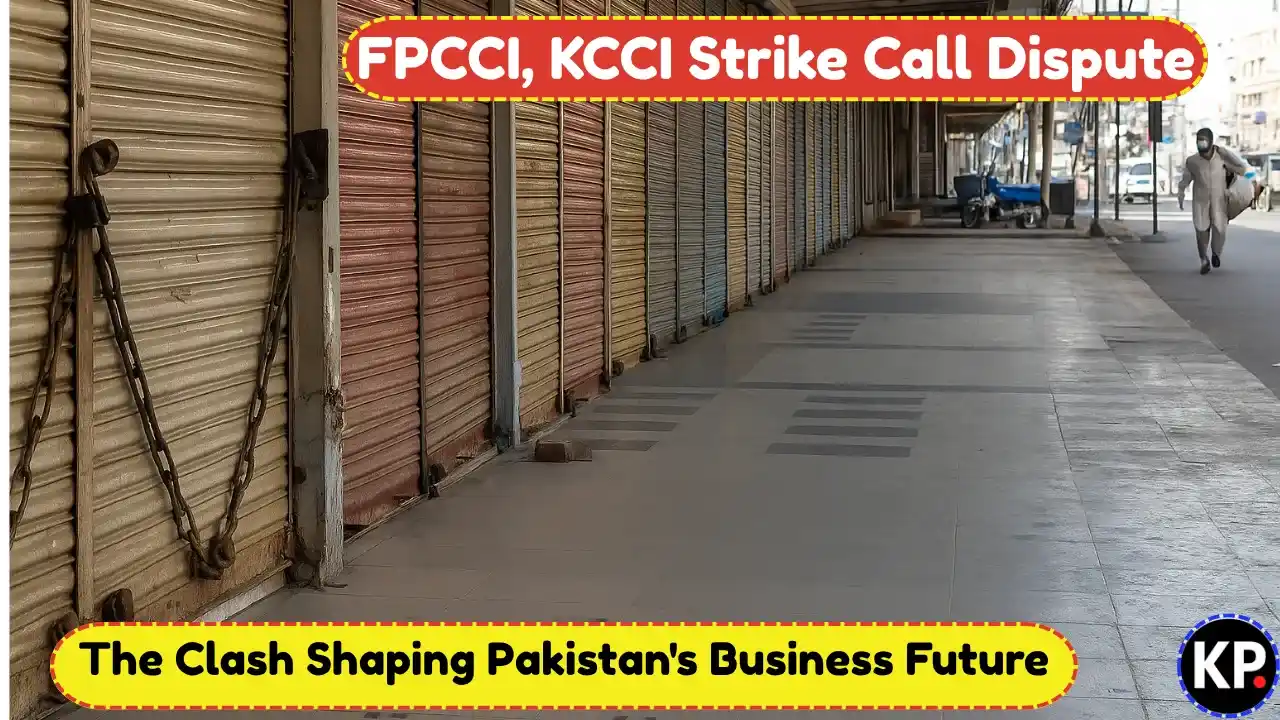The Federation of Pakistan Chambers of Commerce and Industry (FPCCI) and the Karachi Chamber of Commerce and Industry (KCCI) are not on the same page. Their disagreement about a strike call has created major buzz in the country. But why are these two big chambers in conflict? Let’s break it down in simple terms.
The Backstory: What Sparked the Strike?
Everything began with the Finance Act 2025. It included rules that many traders felt were harsh and unfair. To protest, the business community announced a nationwide shutter-down strike.
The FPCCI entered talks with the government. They received verbal promises that changes would be made to the act. So, FPCCI backed out of the strike.
But the KCCI didn’t agree. They believed the promises were too vague. They asked for written assurance. Without that, they chose to move forward with the strike in Karachi.
Also Read: How to Get 13500 from BISP July Payment 2025
Why KCCI Refused to Step Back
According to KCCI President Jawed Bilwani, most of their demands were accepted verbally. However, no official document was signed. This made the KCCI feel the government might go back on its word.
They decided to take a strong stand. Bilwani even warned that the strike could be extended if needed. He stressed that Karachi’s business community was united and ready for long-term action.
What’s in the Finance Act 2025?
The new law introduced Clause 9 and changes to Article 37A. Traders feared these parts would increase taxes and create more problems for small businesses.
To calm the situation, the government formed a special committee. It included industry experts and was headed by Haroon Akhtar, the Prime Minister’s advisor. The government agreed to remove Clause 9 and promised to review other sections too.
Still, the KCCI wasn’t satisfied. They needed clear and written confirmation. Until then, they refused to trust just verbal talks.
FPCCI’s Peaceful Approach
Unlike KCCI, the FPCCI trusted the talks. They believed the government was serious about fixing the issues. Their president, Atif Ikram Sheikh, thanked officials for being responsive.
A four-member committee was also planned. It would include members from FBR, FPCCI, and the private sector. This group would work on remaining issues and keep communication open.
The FPCCI made it clear. They don’t want confrontation. They believe in resolving issues through dialogue.
Nationwide Response from Traders
The strike wasn’t limited to Karachi. Traders from Lahore, Multan, Faisalabad, Peshawar, and Sialkot also joined in. Their participation showed that the concerns were widespread.
Most traders felt frustrated. They want results, not promises. The Finance Act has shaken their trust in government policies.
What Does This Dispute Show?
This conflict is more than just a strike. It’s a sign of deeper problems between the business sector and the government. On one side, FPCCI believes in giving dialogue a chance. On the other, KCCI demands clear proof before trusting the government.
This split shows that even among business leaders, there’s no single approach. It also proves one important thing: trust must be earned—not just with words, but with actions.
Also Read: How to Apply for e Car Scheme Pakistan Apply Online
Final Thoughts
The FPCCI-KCCI strike call dispute highlights the need for better communication. The government must offer clear, written solutions. Only then can they win back the trust of business owners.
Both sides want the same thing—fair policies and economic relief. But they’re taking different roads to get there. What happens next depends on how seriously the government listens and responds.
FAQs
1. Why did FPCCI cancel the strike?
FPCCI called off the strike after the government promised to review the law and address trader concerns.
2. Why did KCCI continue the strike?
KCCI didn’t receive any written confirmation of the government’s promises. They feared verbal agreements could be broken.
3. What changes were proposed in the Finance Act 2025?
Clause 9 was removed, and Article 37A is under review. Traders said these clauses hurt small businesses.
4. Which cities supported KCCI’s strike?
Traders in Karachi, Lahore, Multan, Faisalabad, Peshawar, and Sialkot took part in the strike.
5. What’s next for Pakistan’s traders?
A new committee is set to handle trader complaints. The focus now is on transparency and written agreements.









